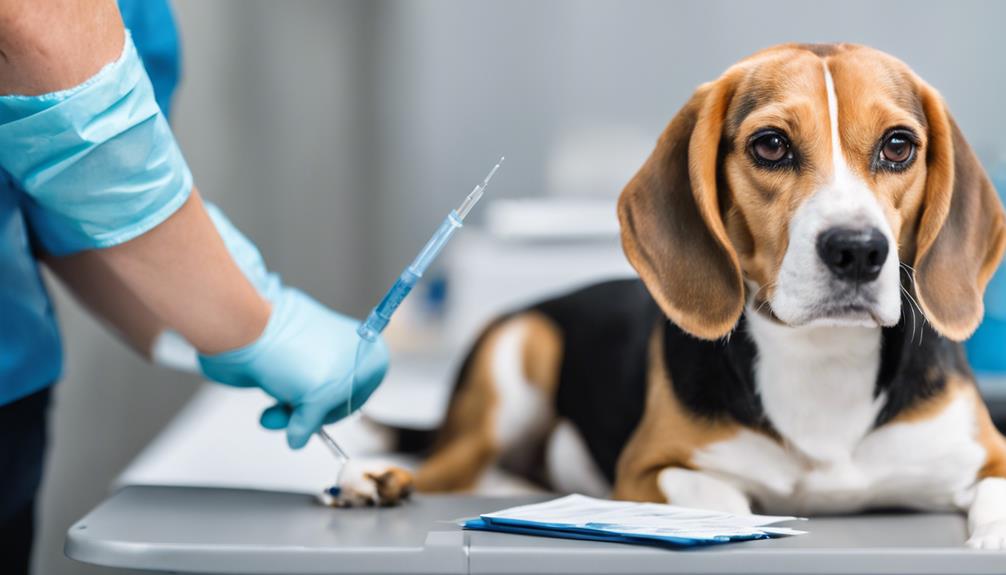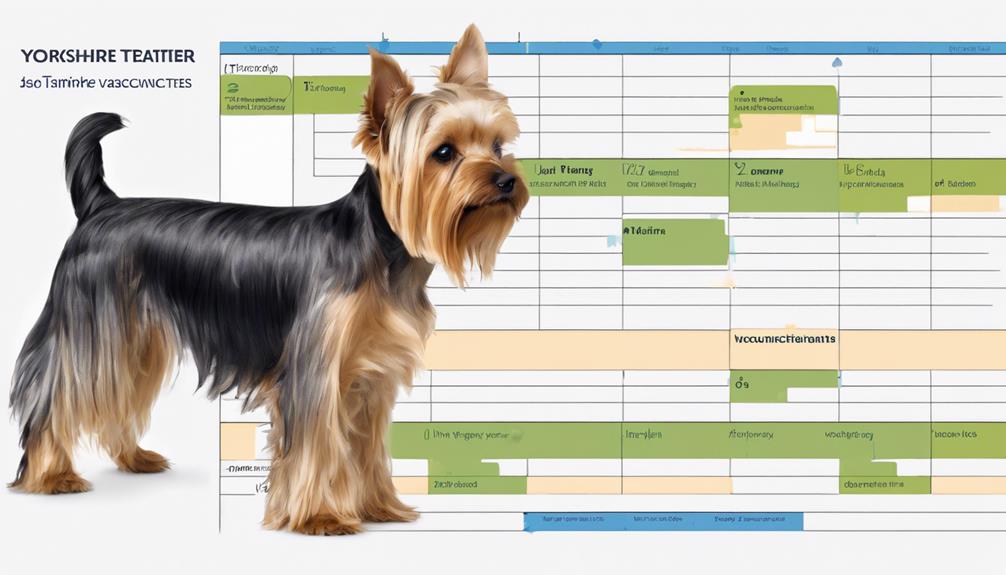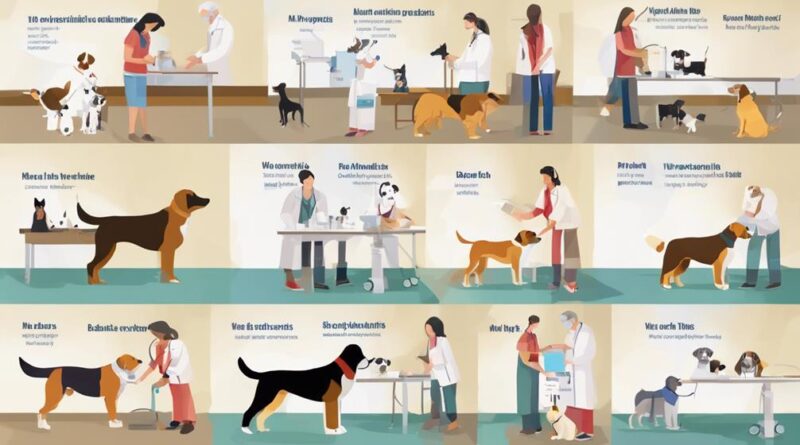Top 10 Breed-Specific Dog Vaccination Schedules
Understanding top 10 breed-specific dog vaccination schedules is crucial for tailored preventive care. Ensure early vaccinations for puppies and regular boosters for vaccine effectiveness. Core vaccines protect against common diseases, tailored to breed predispositions. Regular vet check-ups post-vaccination optimize health. Consider specific health concerns unique to each breed for optimal care. Maintain their well-being and longevity with proper vaccination schedules.
Labrador Retriever Vaccination Schedule
When vaccinating your Labrador Retriever, it's crucial to follow a specific schedule recommended by veterinarians to ensure their optimal health. Labrador Retrievers are active and energetic dogs that require ample exercise to stay healthy and happy. Regular walks, playtime, and activities that engage them mentally are essential to meeting their exercise requirements. Lack of exercise can lead to obesity and behavioral issues in Labradors, so incorporating daily physical activities into their routine is vital.
In terms of grooming needs, Labrador Retrievers have a short, dense double coat that sheds moderately throughout the year and heavily during shedding seasons. To maintain their coat's health and minimize shedding, brushing them a few times a week with a slicker brush or undercoat rake is recommended. Bathing should be done occasionally using a mild dog shampoo to keep their coat clean without stripping its natural oils. Additionally, regular nail trims, ear cleanings, and dental care are essential parts of their grooming routine to prevent infections and maintain overall hygiene.
German Shepherd Vaccination Schedule
To ensure the optimal health of your German Shepherd, veterinarians recommend following a specific vaccination schedule tailored to their needs and lifestyle. German Shepherds are prone to certain health conditions, making a well-thought-out vaccination plan vital for their overall well-being. Here's what you need to know:
- Early Vaccination is Key: German Shepherd puppies should receive a series of vaccinations starting at 6-8 weeks of age. These initial vaccines are crucial for building up their immunity against common diseases like parvovirus, distemper, and adenovirus.
- Regular Booster Shots: As your German Shepherd grows, it's important to stick to a schedule for booster shots. These reinforcements help maintain the effectiveness of the initial vaccines and ensure long-lasting protection against diseases.
- Tailored Vaccination Approach: Due to the breed's predisposition to certain health issues, such as hip dysplasia and allergies, your veterinarian may recommend a personalized vaccination plan. This tailored approach takes into account your German Shepherd's unique health requirements and minimizes the risk of over-vaccination while maximizing vaccination effectiveness.
Golden Retriever Vaccination Schedule
For optimal health maintenance in Golden Retrievers, adhering to a specific vaccination schedule tailored to their unique requirements is essential. Golden Retrievers are friendly, intelligent dogs that require proper care from an early age. When it comes to vaccination, starting with a core set that includes vaccines for distemper, parvovirus, adenovirus, and rabies is crucial. These vaccines should be administered when your Golden Retriever is a puppy and then maintained through regular boosters as recommended by your veterinarian.
Puppy socialization and training are also vital for Golden Retrievers. Early socialization helps prevent behavior problems and ensures your dog is well-adjusted to various environments. Training should be positive and consistent to harness their intelligence and eagerness to please. Alongside this, nutrition plays a significant role in your Golden Retriever's overall health. A balanced diet that meets their nutritional needs is essential, helping to maintain a healthy weight and prevent issues like obesity.
Exercise is key for Golden Retrievers to keep them physically and mentally stimulated. Regular walks, playtime, and activities that engage their retrieving instincts are ideal. However, be mindful of not over-exercising puppies to avoid joint problems later in life. By following a tailored vaccination schedule, focusing on puppy socialization, training, providing proper nutrition, and ensuring adequate exercise, you can help your Golden Retriever lead a healthy and fulfilling life.
French Bulldog Vaccination Schedule
Developing a tailored vaccination schedule for your French Bulldog is crucial to ensure their optimal health and protection against common diseases. French bulldog puppy vaccinations are essential to provide immunity against various illnesses. Starting with a series of core vaccines such as distemper, parvovirus, and adenovirus at around 6-8 weeks of age, followed by booster shots every 3-4 weeks until they're around 16 weeks old, is crucial for their early protection. Socialization is also vital during this time to ensure they're well-adjusted and less stressed in various environments.
When your French Bulldog reaches adulthood, maintaining their health through regular vet check-ups and vaccinations is key. Adult booster shots, including vaccines for rabies, leptospirosis, and Bordetella, should be administered annually or as recommended by your veterinarian. These booster shots help strengthen their immune system and protect them from potentially life-threatening diseases.
Properly spaced and timed vaccinations, along with appropriate socialization, are the cornerstones of your French Bulldog's preventative healthcare. By staying up-to-date with their vaccination schedule and following your vet's recommendations, you can help your furry companion lead a long, healthy life.
Poodle Vaccination Schedule
Properly timing and administering vaccinations is crucial to safeguarding your Poodle's health and immunity against common diseases. Poodles are known for their hypoallergenic coats, which require regular grooming to prevent matting and maintain their signature curly look. Socialization techniques are essential for Poodles to develop good behavior around people and other animals.
When it comes to exercise needs, Poodles are an active breed that requires regular physical activity to stay healthy and mentally stimulated. Daily walks, playtime, and even agility training can help meet their exercise requirements. Common health issues in Poodles include hip dysplasia, progressive retinal atrophy, and certain skin conditions. Regular veterinary check-ups can help detect these issues early on.
As for vaccinations, Poodles should follow a standard schedule recommended by veterinarians. Core vaccines such as rabies, distemper, parvovirus, and adenovirus are essential to protect your Poodle from serious diseases. Non-core vaccines may be recommended based on your Poodle's lifestyle and risk factors. It's crucial to discuss with your vet and tailor the vaccination schedule to your Poodle's specific needs. By staying proactive with vaccinations and overall healthcare, you can ensure a long and healthy life for your beloved Poodle.
Bulldog Vaccination Schedule
Ensuring your Bulldog receives timely vaccinations is crucial for protecting their health and immunity against common diseases. Bulldogs are susceptible to specific health concerns, so following a tailored vaccination schedule is essential to keep them healthy and happy.
Here are some key points to consider when vaccinating your Bulldog:
- Bulldog Health Concerns: Bulldogs are prone to certain health issues such as respiratory problems, skin infections, and joint disorders. Vaccinations play a vital role in preventing some of these conditions and keeping your Bulldog in optimal health.
- Vaccination Schedule: Consult with your veterinarian to create a customized vaccination schedule based on your Bulldog's age, lifestyle, and risk factors. Typically, Bulldogs should receive core vaccines for protection against diseases like rabies, distemper, parvovirus, and adenovirus.
- Vaccination Side Effects: While vaccinations are crucial for disease prevention, it's essential to be aware of potential side effects. Mild side effects like soreness at the injection site or mild fever can occur, but severe reactions are rare. Monitor your Bulldog after vaccinations and contact your vet if you notice any concerning symptoms.
Beagle Vaccination Schedule

To safeguard your Beagle's health effectively, establishing a tailored vaccination schedule is crucial. Beagles are generally a healthy breed, but there are specific health concerns to watch out for. When it comes to vaccinations, your Beagle should follow a standard protocol recommended by veterinarians. Vaccines for distemper, parvovirus, adenovirus, and rabies are essential for Beagles, given their susceptibility to these diseases.
Beagle health concerns include issues like intervertebral disc disease, epilepsy, hypothyroidism, and cherry eye. While vaccinations can't prevent all of these conditions, they can help protect your Beagle from common contagious diseases. Your veterinarian will be able to advise you on the best vaccination schedule based on your Beagle's individual health needs.
In addition to vaccinations, ensuring your Beagle gets enough exercise is crucial for their overall well-being. Beagles are an active breed with high exercise requirements. Regular walks, playtime, and mental stimulation are vital to prevent behavioral issues that may arise from boredom or lack of physical activity. By incorporating regular exercise into your Beagle's routine, you can help maintain their health and happiness.
Rottweiler Vaccination Schedule
For Rottweilers, maintaining a proper vaccination schedule is vital to protect them from common contagious diseases and ensure their long-term health. Rottweilers are susceptible to various health issues, and vaccination plays a crucial role in preventing these.
Here are some key points to consider for the vaccination schedule of Rottweilers:
- Early Vaccination: Begin vaccinations early in the puppy stage to provide immunity against diseases like parvovirus, distemper, and adenovirus. Early vaccination sets the foundation for a healthy immune system and prevents potential health implications.
- Core Vaccines: Rottweilers should receive core vaccines such as rabies, distemper, parvovirus, and adenovirus. These vaccines are highly effective in preventing severe illnesses and ensuring the overall well-being of your Rottweiler.
- Booster Shots: Regular booster shots are essential to maintain vaccination effectiveness. Follow-up vaccinations are necessary to reinforce immunity levels and provide continued protection against diseases that could have detrimental health implications for your Rottweiler.
Maintaining a consistent and timely vaccination schedule is crucial for the health and longevity of your Rottweiler. By staying up-to-date with vaccinations, you can significantly reduce the risk of infectious diseases and safeguard your Rottweiler's well-being.
Yorkshire Terrier Vaccination Schedule

Maintaining an appropriate vaccination schedule for Yorkshire Terriers is crucial for their health and protection against common contagious diseases. Due to their small size and Toy breed classification, Yorkshire Terriers have specific vaccination considerations that owners should be aware of to ensure their well-being. Small dogs, like Yorkshire Terriers, are more susceptible to certain health risks, making vaccinations even more essential for their overall health.
When it comes to Toy breeds, such as Yorkshire Terriers, their size can play a significant role in how they respond to vaccinations. These dogs require smaller vaccine doses compared to larger breeds due to their size. It's crucial for owners to work closely with their veterinarians to determine the appropriate vaccine dosage and schedule for their Yorkshire Terriers.
Additionally, small dogs like Yorkshire Terriers are more prone to vaccine reactions compared to larger breeds. This makes it even more important to follow the recommended vaccination schedule and monitor your Yorkie closely after receiving a vaccine. Common health risks for small dogs include respiratory issues, dental problems, and hypoglycemia, which can be exacerbated by preventable diseases that vaccines protect against.
Boxer Vaccination Schedule
In considering the vaccination needs of Boxers, their size and breed-specific factors must be taken into account for an effective vaccination schedule. Boxers are a medium to large breed known for their playful and energetic nature. When establishing a vaccination timeline for Boxers, it's crucial to consider their susceptibility to certain health concerns. Here are some key points to keep in mind:
- Boxer breed specific: Boxers are prone to certain genetic health conditions such as cardiac issues and cancers. Vaccinations can help prevent some diseases, but regular vet check-ups are essential to monitor the overall health of your Boxer.
- Vaccination timeline: Boxers should receive their core vaccinations, including rabies, distemper, parvovirus, and adenovirus, starting as puppies. Boosters are typically needed every 3-4 weeks until they're about 16 weeks old. After the initial series, regular boosters are necessary to ensure continued protection.
- Common health concerns: Boxers are at risk for conditions like hip dysplasia, aortic stenosis, and certain allergies. While vaccinations play a crucial role in preventing infectious diseases, maintaining a healthy lifestyle and staying up to date with vet visits are equally important in caring for your Boxer's overall well-being.
Frequently Asked Questions
Can I Use the Same Vaccination Schedule for Mixed-Breed Dogs?
Yes, you can use a similar vaccination schedule for mixed-breed dogs as for purebred dogs. However, it's crucial to consider any breed-specific allergies or health conditions.
Some mixed breeds may require additional boosters based on their genetic predispositions. Consult with your veterinarian to tailor a vaccination plan that suits your dog's unique needs.
Regular check-ups are essential to ensure your furry friend stays healthy and protected against common diseases.
Are There Any Breed-Specific Allergies or Reactions to Vaccines?
When it comes to breed-specific allergies or reactions to vaccines, some dogs may have genetic predispositions that make them more prone to certain sensitivities.
These sensitivities can vary based on the breed's genetic makeup and may result in different reactions to vaccines.
It's essential to be aware of potential breed-specific issues and work closely with your veterinarian to tailor a vaccination plan that considers these factors for your dog's well-being.
How Do I Know if My Dog's Breed Requires Additional Boosters?
To determine if your dog's breed needs extra boosters, assess breed-specific immunity and genetic predispositions. Some breeds may require more vaccines due to lower immunity levels or genetic tendencies toward certain diseases. Consult with your vet to understand if your dog's breed-specific vaccine efficacy and dosage differ from standard guidelines.
Monitoring your dog's health and discussing any concerns with your vet can help ensure they receive the necessary protection.
Do Certain Breeds Have a Higher Risk of Vaccine-Related Side Effects?
Certain breeds may have higher risks of vaccine-related side effects due to breed predispositions and genetic factors affecting vaccine responses. It's important to monitor your dog closely after vaccinations for any signs of adverse reactions. Symptoms such as lethargy, swelling, or vomiting should be reported to your veterinarian immediately.
While all dogs should receive necessary vaccinations, certain breeds may need extra attention due to potential higher risks of vaccine-related issues.
Are There Any Breed-Specific Considerations for Vaccine Storage or Administration?
When it comes to vaccine handling, breed-specific protocols can be crucial. Different dog breeds may have specific sensitivities or reactions to vaccines, so it's essential to follow guidelines tailored to their needs.
Factors like size, coat type, and genetic predispositions can impact how vaccines are stored and administered. By understanding these breed-specific considerations, you can ensure the safety and effectiveness of vaccinations for your furry friend.
Conclusion
Overall, it's crucial to adhere to breed-specific vaccination schedules to ensure the health and well-being of your beloved canine companion.
By following the recommended vaccination protocols for your specific breed, you can help protect them from a variety of preventable diseases and infections.
Consult with your veterinarian to create a personalized vaccination plan tailored to your dog's individual needs, ultimately providing them with the best possible care throughout their life.
